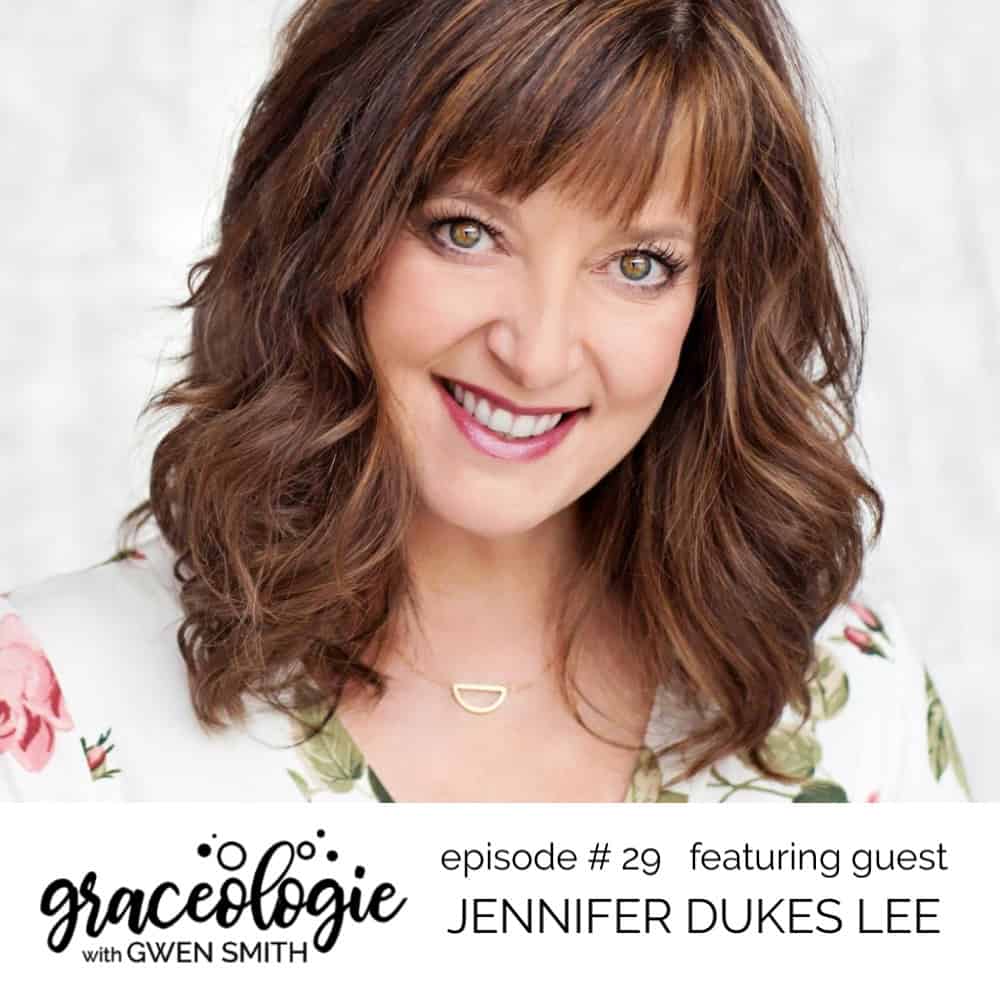
Graceologie Episode 29: Jennifer Dukes Lee

RELATED LINKS:
WEBSITE: JenniferDukesLee.com
JENNIFER on INSTAGRAM
JENNIFER on FACEBOOK
JENNIFER on TWITTER
BUY the BOOK: It's All Under Control
EPISODE SPONSORS:
FabFitFun {Use code: GRACEOLOGIE to get 20% OFF your first box!}
Covenant Eyes {Use code: GRACEOLOGIE to get your first 30 days FREE!}
ALSO by Jennifer: The Happiness Dare
OVERVIEW:
Jennifer Dukes Lee is my guest on the new episode of Graceologie. She's a storyteller, Iowa girl, grace dweller and author of several books, including her latest: It's All Under Control. We talk straight about the control freak in all of us and about a new way of living that will free you to be you, and finally experience the peace of knowing a God who truly has it all under control.
HIGHLIGHTS:
Gwen: How can we stop the busy, and what is the balance between our call to be women of action? Because we are in the word, especially in the book of James, you know, our faith has to have action. We have to mobilize hope to others. We have to feed our families. I mean these people want to eat every day, three times a day. I mean, come on. I mean we have to take care of the widows and the orphans, and give to the poor. We have to clothe the naked, all of this stuff. So where is the balance with the busy? Is there such a thing?
Jennifer: Yes, there actually is. And for me it was first the realization that I had become a series of unstoppable yes’s. Like that whole saying of if you need something done, ask a busy woman to do it. Because I was always giving people my yes's, they kept coming back for more. And oddly enough they were the same people who would tell me at church, and you're so busy, you really just need to not do so much, which was always very ironic to me.
But one of the things that was really important to me as I put together this message and as I lived it out, was that I didn't want to take away the beauty of women like you. Women like the listeners right now, who are called to do really hard things. I think that often we equate surrender to Christ with sort of just constantly doing less. And that's not really what surrender is. Surrender is being more of who God made you to be. It's not all about doing less because the truth is, as you mentioned, we have mouths to feed and babies to take care of, grandkids to take care of, baby jobs, side hustles, all those things that give our life meaning, and fullness and purpose. We can't throw our hands in the air and just spend the rest of our days floating around in the middle of a lake, and that's sometimes the way that surrender looks, like just for self-care, more massages, more time at the lake. And I think those are great things.
But I also want to affirm the achiever listening to this right now who gets things done. I want women like those women in the operating room, when my dad had his leg amputated, I want someone there to control all the bleeding. I want detailed, achieving, ambitious people editing my book. I want those kinds of people teaching my children. So I think the challenge then for us is what stays on the plate and what goes.
And one of the practical steps that I take women through in this book is what I called, “do, delegate, and dismiss.” And I walk them through steps to practically figure out what do I just dismiss, what do I let go of that I don't need to be doing anymore, and what do I delegate, which is super hard for women who are used to helping other people. Like where do I really need to ask for help? And in some cases where do I need to budget financially to pay for help? And then third, that helps you to shine and do what God has actually called you to do so that you can do it with excellence instead of mediocrity.
Gwen: So unpack this a little bit more. Do, delegate, dismiss. I have problems with delegations. I want to talk about that.
Jennifer: Yes. Most women do.
Gwen: So let's just start at the top again and let's be real practical. Talk to a young mom who has one kid on her hip, and three messing up everything in the house. You know, it's chaos, and it's our lives. It's just a constant circling the wagons of sorts. How do we do, delegate, and dismiss?
Jennifer: Well, the first thing you do is you have to really do what I call a brain dump. You have to lay everything out on paper, we don't have the mental capacity to hold and understand everything that we need to do, so we need to actually get it all down. And I take women through this process. Then we walked through what do I do, what do I delegate and what do I dismiss? And so just a practical thing, we'll start with delegating because you mentioned that asking for help is difficult for you. So first, you have to identify why we don't want to ask for help, why do we avoid it? And one of the reasons is that we would rather be the helper than the helped. We don't want to be the helpee.
It's like there's this shift in relationship that leaves us a little uncomfortable and powerless, if we're honest, like for instance, I had to delegate and hire somebody – I had to budget and hire somebody to help me clean my house. And there was a shift in that that made me feel uncomfortable and less of a woman, because a real woman would be able to clean her house herself. Jennifer, you're really going to spend money for a housekeeper. Shouldn't you be able to do that? Look at all those other women who are raising five kids, have two part time jobs and are doing it themselves.
So I think we have to figure out in our own lives and our own budgets what it looks like to ask for help. Another reason that people don't ask for help, see if this sounds familiar, is that collaboration sounds like its more trouble than it's worth. Like we probably need help, but we feel like we can just get it done better and faster if we do it by ourselves. And there's somebody probably listening to this right now that was like that group project leader in high school and they still have nightmares about remembering how they had to do all the work themselves, and like everyone else got the A because of all the work that they did.
And so we get into our heads like, you know what, I'm just going to do it myself. This won't get done the way I want it to get done. And I think we have to get used to the fact that that's true. Like somebody will do it differently if if we ask our mother in law to take care of the kids, there's a chance that they're going to get ice cream for breakfast. You know what that just is going to happen. But there's also a chance that there's going to be something really beautiful that comes out of collaborating and asking for help, relationship that is cemented with grandma and the kids, because of the different way that grandma handled things, the opportunity that you give and when you entrust somebody else, the things or people that are important to you.
I remember when I needed help with VBS, Vacation Bible School some years ago and I'd been doing too much with the VBS program on my own. And I brought in some people to help, that did things differently than me. But not only did it empower them and who they were, they actually did it better than I would have because they had a different set of skills that they were to bring to the table. So I think you have to look at these core reasons why we don't ask for help. And once we start to address those, I think we'll see that our need for asking for help is going to emerge.
Jennifer: There will be times when God will say, let go, but there are other times where it's hang on and let God. Sometimes it's let go and let God, and sometimes it's hang on or hold on and let God. I think that let go can be this way that we get out of doing something that we don't want to do. Like let's say marriage is hard or a friendship is hard. Let's say we're frustrated and fed up with things happening at church. We've become such a disposable culture that we kind of backed down into this default response of let go and let God like just move on to another church. Let go of that relationship is not worth fighting for, but don't let go just because it's hard, let go only when it's time. And I think God brings us to this crossroads every day and there's a sign that points let go, and there's a sign that point's hang on and he is there with us helping us discern which way to go.
But we don't have to walk that one road forever. I think every day in every season is a new opportunity to say this God, do I hang on or let go, and he may shift gears. He may have you let go forever, he may have you let go for a time. He may have you hang on forever, or he may have you hang on for a time. But I think we're constantly in this position of coming to crossroads in our lives, and with the Lord's help and the Holy Spirit's clarity working within us to be able to make wise decisions when we are at those crossroads. Now, I am a flow chart girl. I know this probably doesn't surprise you.
Gwen: Not at all.
Jennifer: I actually have like flow charts and everything to help in the back of my book, to help women sort some of that out. And some decisions are bigger than a flow chart. I mean every decision requires consultation with God, and trusted advisors, but I do believe that providing people some tools to help figure out what to hang onto, and what to let go of is very helpful and practical.
Gwen: And I am all about practical and I'm so glad you went there. So I know another practical way that you come alongside of the readers of your book, “it's all under control” is that you are teaching us to set core boundaries, and in doing so obviously, we're going to be able to experience greater amounts of the peace and purpose that God has for us, and really prioritize. So can you talk to us a bit about setting core boundaries?
Jennifer: Yes. So core boundaries is a really important first step in figuring out, especially figuring out what to dismiss. We talked a moment ago about do, delegate, and dismiss. Dismiss means letting go of assignments that you just need to let them go without guilt. And so one of my core boundaries is, I will not take on responsibilities on the weekend anymore, like speaking engagements that take me away from school activities. I've got a daughter now who's a junior and her time here is short with these high school activities.
Now, there was a time where I did go ahead and do speaking engagements and miss some school activities. And for that season I felt like it was a good thing and it was good for the people I was serving, and I think it was good for the girls to see mom serving Jesus even though it meant sacrifice at home. But right now as it I know that God has established that core boundary for me.
And another core boundary that I have right now is not saying yes to things out of ego and fear of missing out. That was really hard for me because I was recently invited to something over on the east coast that a lot of other authors are going to be at and I wanted to say yes because I wanted to say yes out of ego, because I basically wanted other people to know I got invited.
Gwen: Of course
Jennifer: That is so gross. I'm not proud of that, you know, I could see it was violating my core boundaries and I told the organizer of that event. I'm like look, this is why I have to say no, and I just confessed it to her. So I'm still figuring this stuff out, but I think it's really important to figure out what your core boundaries are, because that's going to help you figure out what to say yes to, what to say no to, what to hang onto and what to let go of.
Gwen: Can you speak specifically to the Graceologie listener? For lack of better phrasing, who's a yes girl, who finds joy and serving others and is on the haggard side of weary as a result?
Jennifer: Well, I think if what she's doing is bringing her joy, then she's probably doing well and she's probably serving her purpose. I think that weariness and joy rarely go hand in hand. Maybe you know, I just don't think that like, I don't think that you can live at both of those feelings at once. So I think if they're really, really wiry, there's probably something that has to go. So I would look at what is essential because there really are some things that we have to do that don't bring us joy. I have to do business expenses. I hate it with a passion, but I don't want the IRS coming after me. So there are some things that I just did that are essential that I just have to do.
And then there are some things that I actually love to do, that maybe to some people don't seem essential or maybe some people think is foolish. Like I go do my boot camp at – I get up at 5:45 in the morning and go do boot camp in town, and to me that is something I do because it makes me feel good. It's not for everybody. I make time for naps every Sunday. That's something I do. It's important to me. I lead a youth group for our church and there's only a few – there's not very many kids in our country church, but it's important to me. And so I think that those things bring joy to my life.
And when I hit that point where you have to dig a mile deep to find my smile or my happiness, is that really the joy of the Lord? And so I have to look at how I'm feeling, and how I'm thinking and how my body is responding in order to figure out what to do. The older I get, the more it's clear to me that my body can't handle the level of responsibility that I carried in my 20s, which is hard for me because I still have the ambition of my 25-year-old self. But my 46-year-old body has been showing symptoms that are probably stress related, and I have been doctoring for some of those things and having to really redo I do, delegate, dismiss in a very busy season that I'm in right now.
Gwen: Well, we started off the conversation kind of traipsing into the waters of surrender and talking about the things that we can't control, like the weather and there's other factors, and I'm also something that's kind of brewing in my heart as you’re speaking is the fact that as much as we want to establish our essentials and we need to and as much as there is often not the overlap of weariness and joy. There are some things like you said like the IRS stuff, but sometimes the lord calls us to things that we’re not excited about. So can we still find peace in those places?
Jennifer: I think so too. I think the greatest peace comes from knowing that you are in the center of God's will.
Gwen: Exactly!
Jennifer: And sometimes being in the center of God's will is an uncomfortable place to be. Sometimes it's a weary place to be, and I want to just encourage women who are listening right now that are just in like with the little kid situation. I mean those are weary days, and I'm not going to shame women by saying just wait, pretty soon I’ll be out of the house, you just better enjoy it. Like no, it's hard, it is hard and I pray for those women that God just gives them the strength to hang on, and to get through another day. I pray that every day they have a, you know, some glimmer of hope and peace in what they're doing that they can look at their lives and feel like this is – I have a peace despite the business. Peace isn't like the absence of conflict. Peace isn't the absence of business. Peace is the person of Jesus and that we will all cling to that.
 "
"